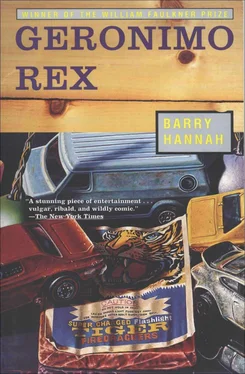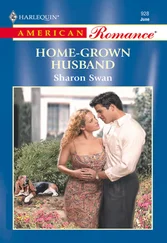But I knew the day I walked out a Ph.D., I would drive home, hear the old man call me Dr. Monroe, then come back to the lab and shoot myself full of #227 itself, and let them watch me shudder, faint, and piss. Or might as well. I hated every minute of every effort of every bit of what I was doing, when I wasn’t writing poems in the log.
I have to back up in that year several months and tell about the first Christmas I did not go home to Dream of Pines. The radiator on my T-bird had rusted out, I could drive it for twenty minutes before steam came out of the hood, but this wasn’t the only reason I didn’t go home to see my brothers, my sister, my nephews and my nieces. It pained me not to be there. I thought about the mistletoe way up in the oak trees around the house; I could smell the spice of the pine needles. My sister had a new infant boy I’d never seen. To the truth, they all cared about me dearly and I’d failed in med school so quickly, I just couldn’t face them. My failures had all been vague before, but now I had one, an expensive one, as definite as a wrecked Oldsmobile. At the time, I was so low, I can only look back and congratulate myself on one thing: I was not carrying the pistol around with me any more. Even though I wore the sinister reptilian coat.
Gad, what to do? All was aimless. I went down to Wright’s, where Silas worked, and played a few records in the booths. I watched Silas, who stayed busy being himself. I admired his energy. He watched out for drab and puny girls entering the store. Instantly, he was their helper. He would make a date with them right on the floor, perhaps selling them a record as he did it. The girls with dry hair and impure complexions, the girls wearing glasses with rims upswept like steer horns. Once, I saw him put his hand on the shoulder of an especially odd girl, and came out of the booth.
“That girl was damn near a pygmy!”
“Hands off,” Silas warned me. “All mine.”
One afternoon a mulatto with flint-like patches under his eyes walked in and went straight to the revolving rack where the band scores were. It was Harley Butte. He had aged. His wife was with him, and his four boys. The wife was his same color. She looked pleasant, but was somewhat old before her time. The boys were of a fresher pumpkin color. They kept around the mother. Silas saw them and rushed over to draw a piano bench out for some of them to sit on. I was in the glass booth and heard nothing. I only saw Silas mouthing at them, with words of great courtesy, and saw the woman pull the baby boy up in her lap. The baby boy wanted to climb up in the showcase of the window and touch the drum set, an exotic collection from Slin-gerland all bright with an oyster and pearl finish. I had an impulse not to come out of the glass booth and show myself to Harley. I don’t understand why I just watched him as long as I did. All I know is, it seemed proper and cozy in the booth, hearing nothing, and it took almost a revolutionary effort for me to open the door and give him my hand.
“Where’s your band?” I said.
“And what the hell’re you doing here?” said Harley. “I been looking for you on TV. Everybody likes those Beatles. I thought you mighta got in with them.”
“It’s been a long time. I’ve been in med school.”
“Who told you to do that?” He seemed angry.
“On my own. I haven’t played my horn for three years.”
“What’d they tell you in college?”
“I told him, Harley. He was playing good trumpet,” Silas jumped in.
“I know he was playing good trumpet. He got a scholarship on playing his trumpet.” He hung down his arms, disappointed, disappointed in me almost to the point of wrath. “I’ll bet somebody told you music doesn’t usually make money. Yeah, I’ve heard that enough times, them telling me.”
To change the subject, I asked Harley what brougiht him to town. He said there was a parade on Capitol Street this afternoon. He didn’t think much of the parade. It was a penny-ante affair with a Negro Santa Claus in it. In fact, he’d put his foot down, saying he could not drag the Gladiators off to every occasion and anybody’s parade. He said it was his opinion that this practice would dilute the class of his band. But the principal of Beta Camina said he was wrong. The principal told him, “Your trae school spirit has been tested and you have received a negative grade.” The principal said, Well then, he’d walk with the band this time. Harley replied he didn’t care about the walking in the white suit and that business, but it was still his band. The principal told him future events would determine that. Then the principal was in his own white uniform and helmet — which he had been hiding in his closet for months — fast as a wink. He told Harley that he might redeem his school spirit by, certainly, traveling to the parade with the Gladiators, directing them as to what music, in what order, they were playing — since the principal did not quite yet comprehend all the details like that — and walking on the sidewalk with the band, primarily to spy out for the threat of that lunatic white man who had pushed the child at him the last time he was in Jackson.
“I might go on back to the army,” said Harley. “You don’t get cut in the back.”
“Ah! Not the army, man,” said Silas.
“I liked the army. Everybody gave such a damn. More people were honest. I think you meet a better breed of people in the army.” He looked awfully tired around the eyes then. He thumbed the music on the stand dismally. Beyond him I saw his wife and kids, all of them sitting patiently except the baby. He wanted to get at those drums.
“I don’t think I know your wife,” I said.
“That’s Miriam.” He made no move to introduce us.
“You have good music here.” Harley suddenly pulled out a band piece called “Charlemagne.” Lower on the page was the composer’s name: H. J. Butte . “This is yours truly.” I examined the score. It was a march, full of runs. In the margins were directives; I should say imperatives, with exclamation points, and inside the cover was a short, exhorting essay on how this piece must be played. The publisher was a New York firm.
“I can’t think right off of any band that could cut this,” I said.
“My band can cut it,” said Harley.
He said goodbye. The family arose and followed him. “Get little Harley, John Philip,” the wife said. The older boy took the baby’s hand and led him out the door.
After they left, a tubby clerk came up and straightened the music on the revolving stand.
“Were you having a family reunion with that nigger?” he said.
“How well is ‘Charlemagne’ moving?” Silas asked. “That nigger wrote ‘Charlemagne.’”
“Well, nobody is buying it. One band director was interested in it. But he said it was too difficult. And I no more believe that nigger wrote it than I believe the moon is the North Wind’s cookie.”
When the parade began, Silas and I went out and found a place next to a lamp post. There was only a thin crowd. A bum leaned against the post itself, taking stock of the two leading floats. Behind them, where we couldn’t see, a band was playing “Silent Night” in march time. The bum turned around. He was tickled pink.
“Nigras!” he said. He was smoking the hell out of a roll-your-own and his eyes were wide as clocks.
“God damn!” shouted Silas. He’d just caught the wind off the bum. I’d been holding my breath.
“I might use tobacco, but I would not take the name of the Lord my God in vain,” said the bum.
“Move out,” said Silas. The bum drifted away, protesting. “Look at the creeps and yokels gawking at the parade. They all think it’s so very amusing. Look at those goddam Central High hoodlums giggling,” Silas demanded.
Читать дальше












